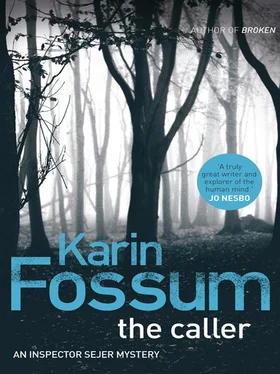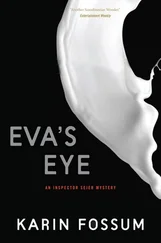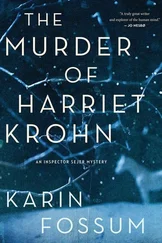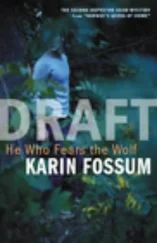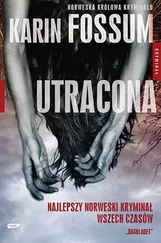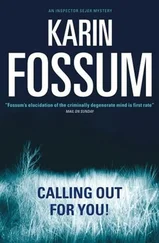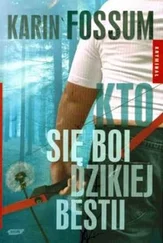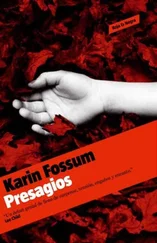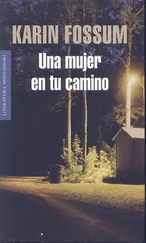‘Did you see anything else?’
‘Just his legs when he ran. He was fast.’ She sank her hands into her jeans pockets.
‘What was he wearing on his feet?’ Sejer asked.
‘Trainers. With black stripes. Old and worn.’
‘Did you get anything else?’ ‘The gorilla mask had a strong odour,’ she said. ‘It smelled like sweets. It must’ve come straight from the shop.’
Sejer nodded. There was something about this girl, something refreshing and forthright. With her wild, tousled hair and jeans, she reminded him of a dishevelled boy. She couldn’t be very strong, but she was self-confident. She was moody, but not shy. She had varnished nails, but she didn’t seem girlie.
‘Did you hear anything?’ Skarre wanted to know.
‘Before or after the attack? Did he say anything? Did you hear a moped, or something? An engine? How did he get away?’
‘He disappeared into the bushes,’ she replied. ‘I didn’t hear anything. Just his heavy breathing.’
‘Yes, I can certainly imagine that,’ Asbjørn Meiner broke in.
‘Did you have any sense of how old he could have been? Was it a man? Or a boy?’
‘You try to guess the age of a gorilla,’ she said.
Asbjørn Meiner, who felt relegated to the sideline, broke in again. ‘It’s great that you want to be tough, Else. I’m amazed you didn’t crap yourself in fright. But you’ll have to help out so we can catch this gypsy once and for all.’
‘He’s probably not a gypsy,’ she said softly.
‘Did he say anything?’ Sejer asked. ‘Did he threaten you?’
‘He just wanted my plait.’
Sejer observed Else Meiner with increasing admiration. Her skin was white as milk, her eyelashes shiny as silk and her large eyes were unusually dark against the light skin, her mouth tiny. She resembles a doll from a puppet theatre, he thought, but there certainly wasn’t anyone controlling Else Meiner’s strings. You’ll make a name for yourself some day, he thought. One way or another.
He stood and walked to the window, looked out at Rolandsgata. Then he turned back to the girl. ‘Has anyone harassed you lately? Has anyone badgered you or teased you? Or threatened you?’
‘No,’ she said firmly.
‘Who lives in the other houses?’ Sejer asked.
Asbjørn Meiner came up beside him. ‘Good people,’ he said. ‘You won’t find anything on this street. The Nomes live on the right side, in the brown Swiss chalet. Beside them live Reinertsen and Green. They’re actually cousins, and as you can see, they used the same architect. Their houses are a little silly, I think. Then there are the Rasmussens, the Lies and Medinas. On our side, the Håkonsens, the Juels and the Glasers. The Krantzes live in the brick house.’
‘What about the old house furthest away?’ Sejer said and pointed. ‘That one stands out.’
Asbjørn Meiner nodded, and the motion rode his bulky body like a wave. ‘Yes,’ he said, ‘it’s not very nice. But the house was here first, long before the rest. So he’s got every right to it. The house was built back when they used asbestos tiles. An old man lives there, his name is Beskow. Henry Beskow. But we don’t see him much, because he never leaves the house. A carer visits him, gets him out of bed in the morning. There’s also a teenager on a moped who stops by. Must be his grandson. He comes and goes constantly, always in and out. Who is the boy, Else?’ he said.
‘No idea,’ Else Meiner said curtly.
She left the room and Sejer turned. She disappeared suddenly down the hallway, slipping inside her room and leaving the door open. Because he had the feeling that she wanted him to, Sejer followed; the open door was like an invitation. He went to the door and looked in. He noticed a golden instrument lying on her bed.
She sat at her desk with a book.
‘Was it anyone you know?’ he asked gently.
She shook her head. Put her hand in her short hair. ‘I don’t have any gorillas in my circle of friends,’ she said.
He laughed to himself. He liked her more and more. This boldness, and her unique sense of humour.
‘Do you play the trumpet well?’ he asked, and nodded at the instrument on the bed.
‘Yeah, pretty well.’
On the walls she had pictures and posters. He recognised some of them, Orlando Bloom and Leonardo DiCaprio among others. And she had a poster of the Joker. The white face with the red mouth. A few pictures of herself in her band uniform, dark blue with a short white shirt and a sailor cap with a silken tassel. On her bed lay a pile of cushions. One of them was a red, heart-shaped cushion with an elegantly embroidered message: I love Johnny .
‘Why do you think he wanted your plait?’
She threw her head back. ‘He probably has a collection, and now it’s stuffed in a drawer, with black and brown and blonde plaits. Maybe he sniffs them at night.’
Her response confused him. Was it some kind of girlish prank? Had she made it all up to get noticed? Girls did that sometimes. Girls who wanted drama and attention. But he didn’t believe this was the case with Else.
She rose, moved to the wall and removed a photo of herself with the plait still attached.
‘He’s got himself quite a trophy,’ Sejer said.
He thanked her and left the room, went back to Skarre and Meiner.
‘Someone slashed her bicycle tyres,’ Meiner said. ‘A few days ago. Up near the Sparbo Dam. What’s going on? How many pranksters are there? It’s one thing after another.’
‘What do you think?’ Skarre asked.
‘Someone has made it his mission to terrorise our lives. Some rotten little shit. Make sure you nail him, and make sure he gets a good whipping.’
‘Watch Else,’ Sejer encouraged him.
On the way back to the car, Sejer got a call from Frances Mold.
She spoke rapidly and feverishly. She was very concerned for her mother.
‘What happened?’ Sejer asked calmly.
‘It’s just been too much for her,’ Frances said. ‘She had some kind of reaction, and her heart began beating really fast and irregularly. Now she’s been admitted to the hospital. They’ve got to run tests.’
While Gunilla Mørk went around and philosophised about life and death.
While Evelyn Mold attempted to recover.
While Astrid and Helge Landmark slowly reconciled themselves to how things stood.
Karsten Sundelin considered his life.
He thought about the choices he’d made and his motives.
Why did I fall in love with Lily? he thought. Why did we marry? I was smitten because she had French roots, and because her French attracted me. When she whispered to me in that exotic language — words I only suspected the meaning of — it made my blood run faster. Warmed me and filled me with anticipation.
My French lily.
We married, he thought, because we had been together for a long time, because we were adults, and because marriage seemed a natural consequence. I was alone, and I needed someone. People around me began to talk, my parents and friends who saw I was in need; they couldn’t bear to see my sorrow. I fell in love because she was petite and beautiful, because she moved through space with the elegance of a goldfish gliding through water. Why did we have Margrete? Did we think it through properly? Was it a matter of course? And what will she do with her life? Is it my responsibility? Fifteen-year-old Margrete? Thirty-year-old Margrete? Forty-year-old Margrete? If she doesn’t succeed in life, is it my fault? And how, Karsten Sundelin thought, how can I get out of all this?
The time that had lapsed since the incident with Margrete had left its mark on him in many ways. Cracks had appeared in the foundation, small fractures which continued to expand, and which meant his life was about to collapse. He had a more fiery temperament, which was manifested in his gait and other gestures — something testy and jagged — and he slammed doors more forcefully. Sometimes, when he was completely honest with himself — for example in the evening, after a few beers — he knew he wasn’t in love with Lily any more. No, it was worse than that: he had begun to dislike her. He couldn’t handle her femininity, her fear and vulnerability. Whenever he had these thoughts, despair filled him instantly, because maybe he was the one who had failed them.
Читать дальше
